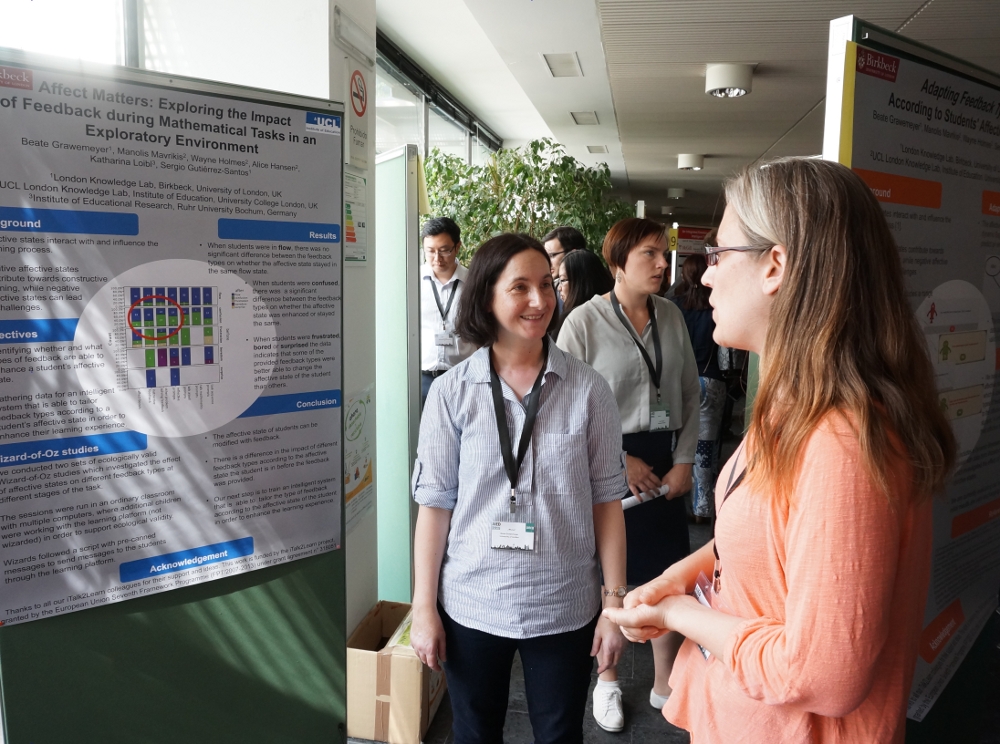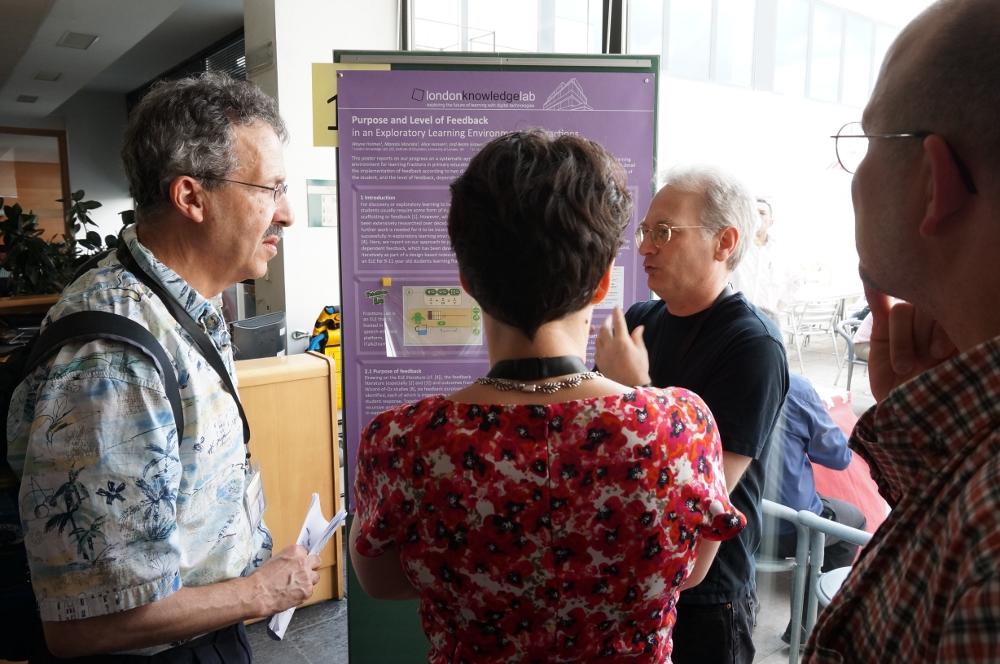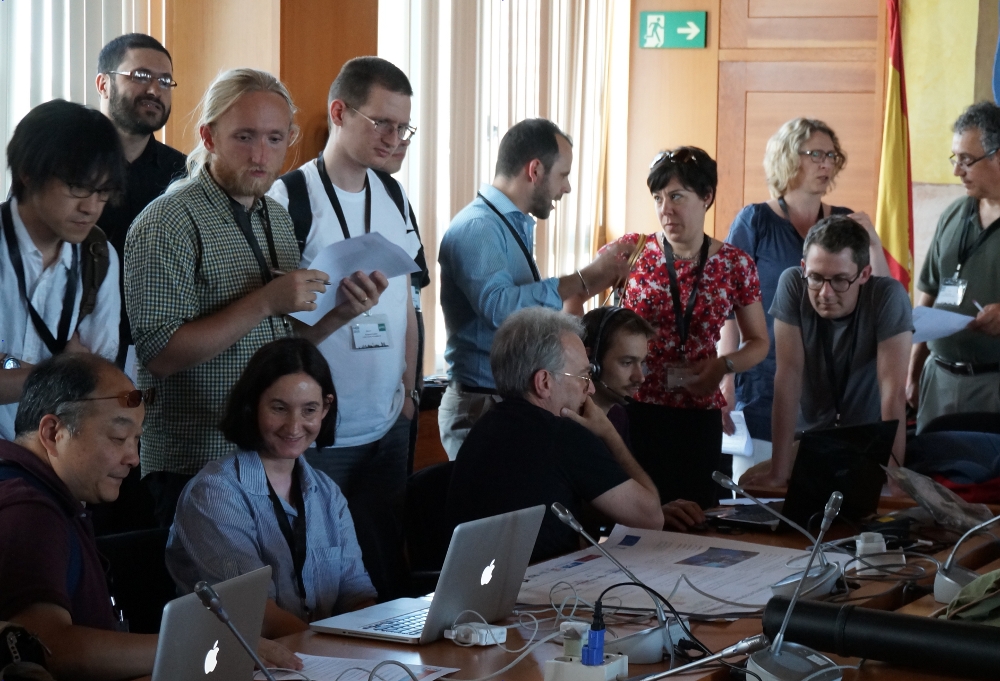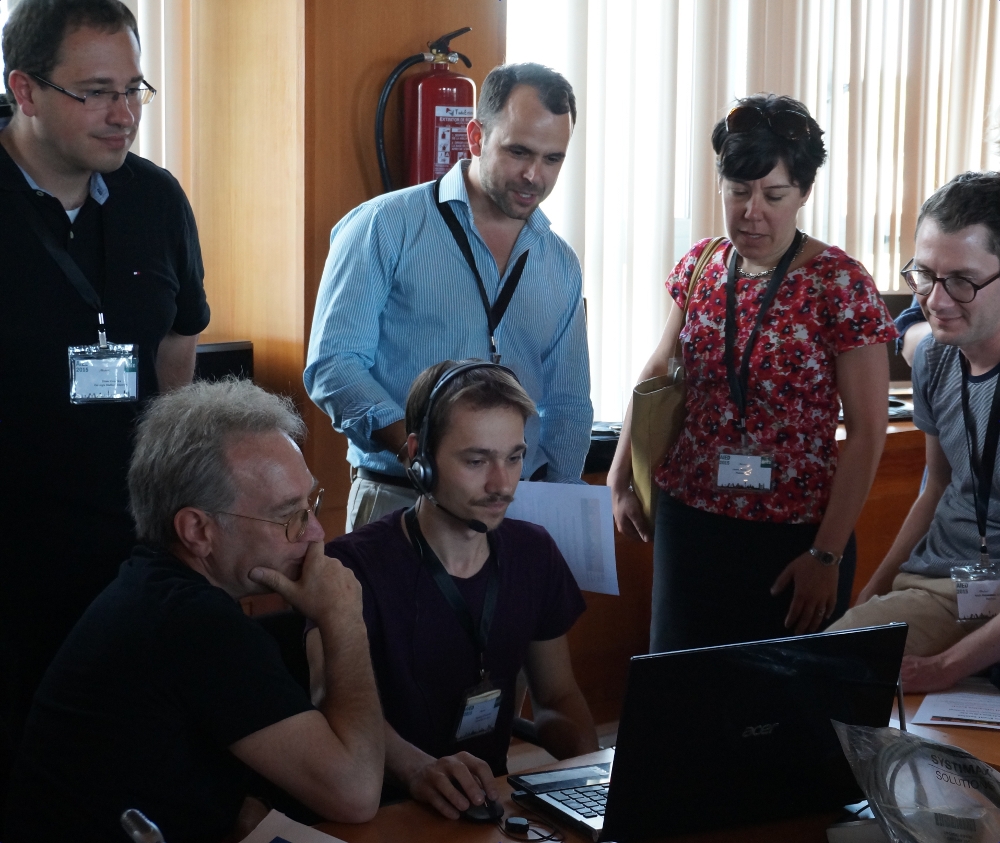iTalk2Learn is present at this year’s AIED and EDM conferences with several contributions
This year AIED 2015 (17th International Conference on Artificial Intelligence in Education) and EDM 2015 (8th International Conference on Educational Data Mining) are collocated and take place from June 22, 2015 until June 29, 2015 in Madrid. iTalk2Learn is present at this event with several contributions: workshop organisation and participation, poster and paper presentation and platform demonstration.
International Conference on Artificial Intelligence in Education (AIED)
iTalk2Learn is represented at the AIED 2015 by the 3 posters:

- Affect Matters: Exploring the Impact of Feedback during Mathematical Tasks in an Exploratory Environment, by Beate Grawemeyer, Manolis Mavrikis, Wayne Holmes, Alice Hansen, Katharina Loibl and Sergio Gutiérrez-Santos
- Adapting Feedback Types According to Students’ Affective States, by Beate Grawemeyer, Wayne Holmes, Manolis Mavrikis and Sergio Gutiérrez-Santos
- Purpose and Level of Feedback in an Exploratory Learning Environment for Fractions, by Wayne Holmes, Manolis Mavrikis, Beate Grawemeyer and Alice Hansen

as well as by a demonstration of the university partners of the iTalk2Learn platform in the interactive event session.


Additional to the posters and the demo, the iTalk2Learn partners London Knowledge Lab and Birkbeck School of Computer Science organised together with the Vanderbilt University and the Ithaca College the workshop Intelligent Support in Exploratory and Open-ended Learning Environments (ISEOLE@AIED’15). The workshop builds on the work done in several editions of the Intelligent Support in Exploratory Environments workshop (including the one in AIED 2009 and the Scaffolding in Open-ended Learning Environments in AIED 2013). The previous workshops mainly explored scaffolding and other approaches to providing intelligent support. In this workshop the topics are broaden but also focus particularly into how ELEs or OLEs can be used in the classroom. iTalk2Learn partners presented the iTalk2Learn intervention model in this workshop by the talk:
- Robust student knowledge: Adapting to individual student needs as they explore the concepts and practice the procedures of fractions, by Claudia Mazziotti, Wayne Holmes, Michael Wiedmann, Katharina Loibl, Nikol Rummel, Manolis Mavrikis, Alice Hensen, Beate Grawemeyer
Furthermore, the iTalk2Learn partners Birkbeck University of London and University College London organised together with the University of Sussex, the University of Veracruz and the Universidad Nacional de Educación a Distancia an AIED-EDM collocated workshop: the International Workshop on Affect, Meta-Affect, Data and Learning (AMADL 2015) dealing with emotions and affect. Emotions and affect play an important role in learning. There are indications that meta-affect – knowledge about self-affect – might also play a role. There have been various attempts to take them into account both during the design and during the deployment of AIED systems. The evidence for the consequential impact on learning is beginning to strengthen but the field has been mostly focusing on addressing only the complexities of affective and emotional recognition. This has largely slowed down progress on this area. Research needs to be carried out in order to better understand how to respond to what we detect and how to relate to the learner’s cognitive and meta-cognitive skills. One goal might be to design systems capable of recognizing, acknowledging, and responding to learners’ states with the aim of promoting those that are conducive to learning by means of tutorial tactics, feedback interventions: interface adaptations that take advantage of ambient intelligence, for instance. Therefore, we need to deepen our knowledge of how emotions relate to issues such as cognition and context. The workshop is intended to bridge the existing gap between previous research with the ever-increasing understanding and data availability. The collocation of AIED and EDM workshop raises the opportunity to bring the two communities together in a lively discussion about the overlap in the two fields. The iTalk2Learn university partners are presenting two papers in this workshop: in the session Affect and Feedback the paper
- The impact of feedback on students’ affective states, by Beate Grawemeyer, Manolis Mavrikis, Wayne Holmes, Alice Hansen, Katharina Loibl and Sergio Gutiérrez-Santos
and in the session Affect recognition the paper
- Recognising Perceived Task Difficulty from Speech and Pause Histograms, by Ruth Janning, Carlotta Schatten and Lars Schmidt-Thieme
is presented. The first paper investigates feedback and affective states. Affective states play a significant role in students’ learning behaviour. Positive affective states can enhance learning, while negative affective states can inhibit it. The paper describes a Wizard-of-Oz study that investigates the impact of different types of feedback on students’ affective states. The results indicate the importance of providing feedback matched carefully to the affective state of the students in order to help them transition into more positive states. For example, when students were confused affect boosts and specific instructive feedback seem to be effective in helping students to be in flow again. The paper discusses this and other ways to adapt the feedback, together with implications for the development of a system and the field in general.
The second paper proposes a new kind of features for affect recognition. Currently, a lot of research in the field of intelligent tutoring systems is concerned with recognising student’s emotions and affects. The recognition is done by extracting features from information sources like speech, typing and mouse clicking behaviour or physiological sensors. In former work some low-level speech features were proposed for perceived task difficulty recognition in intelligent tutoring systems. However, by extracting these features, some information hidden in the speech input is lost. Hence, in the paper speech and pause histograms are proposed and investigated as features, which preserve some of the lost information. The approach of using speech and pause histograms for perceived task difficulty recognition is evaluated by experiments on data collected in a study with German students solving mathematical tasks.
International Conference on Educational Data Mining (EDM)
Also at the EDM 2015 iTalk2Learn is represented by a poster and a paper presentation. The poster
- How to Aggregate Multimodal Features for Perceived Task Difficulty Recognition in Intelligent Tutoring Systems, by Ruth Janning, Carlotta Schatten and Lars Schmidt-Thieme
proposes an approach for multimodal feature aggregation for affect recognition. Multimodal affect recognition approaches use several information sources. Those approaches usually focus on the recognition of emotions or affects, but not on how to aggregate the multimodal features in the best way to reach the best recognition performance. In the paper an approach is proposed which combines methods from feature selection and ensemble learning for improving the performance of perceived task difficulty recognition.
The paper
- A Transfer Learning approach for applying Matrix Factorization to small ITS datasets, by Lydia Voß, Carlotta Schatten, Claudia Mazziotti and Lars Schmidt-Thieme
investigates the exploitation of the concept of Transfer Learning for ameliorating Performance Prediction. Machine Learning methods for Performance Prediction in Intelligent Tutoring Systems have proven their efficacy; specific methods, e.g. Matrix Factorization, however suffer from the lack of available information about new tasks or new students. In the paper is shown how this problem could be solved by applying Transfer Learning, i.e. combining similar but not equal datasets to train Machine Learning models. Promising results were obtained by combining data collected of German fractions’ tasks (517 interactions, 88 students, 20 tasks) with their non exact translation of a previously American US version (140 interactions, 14 students, 16 tasks). Also, the performance of Matrix Factorization based predictors were analyzed on smaller Intelligent Tutoring System samples evaluating their usefulness.
iTalk2Learn has won the best interactive event award at AIED 2015!

iTalk2Learn has won the best interactive event award at AIED 2015!


